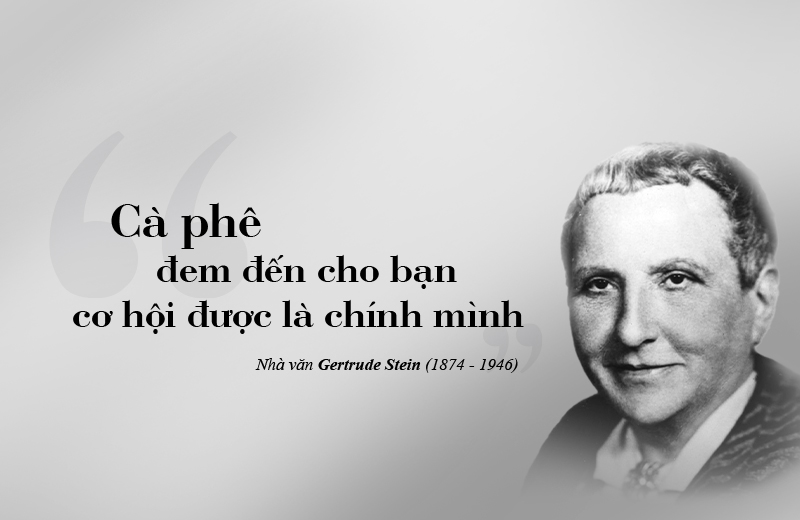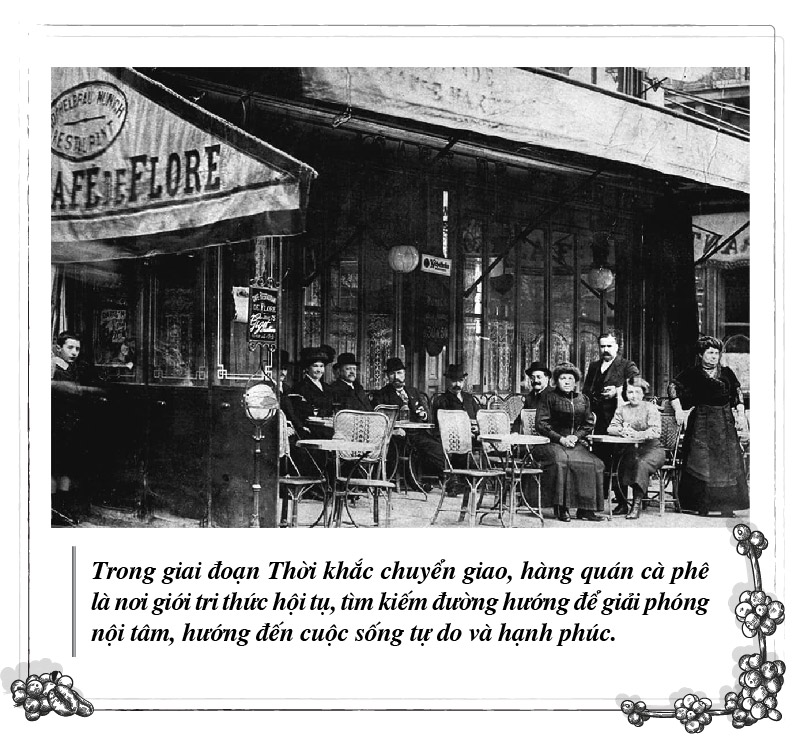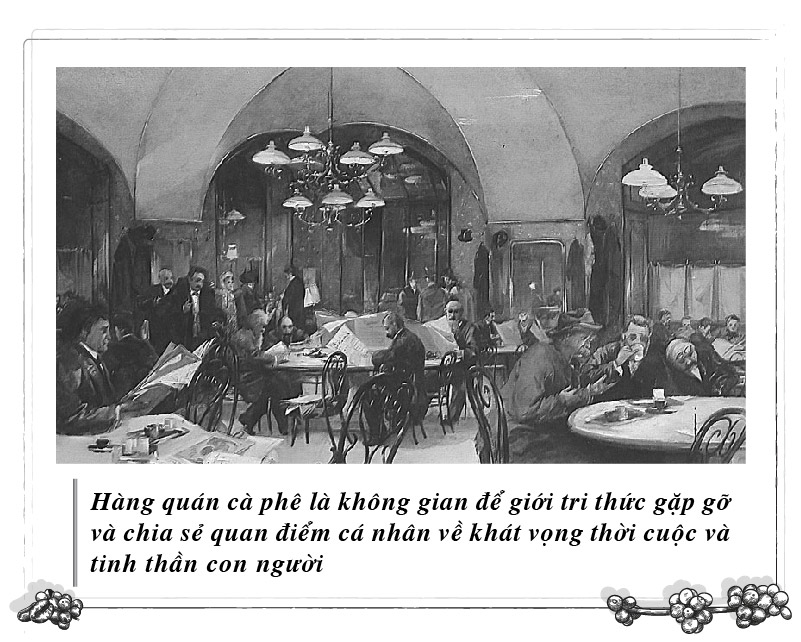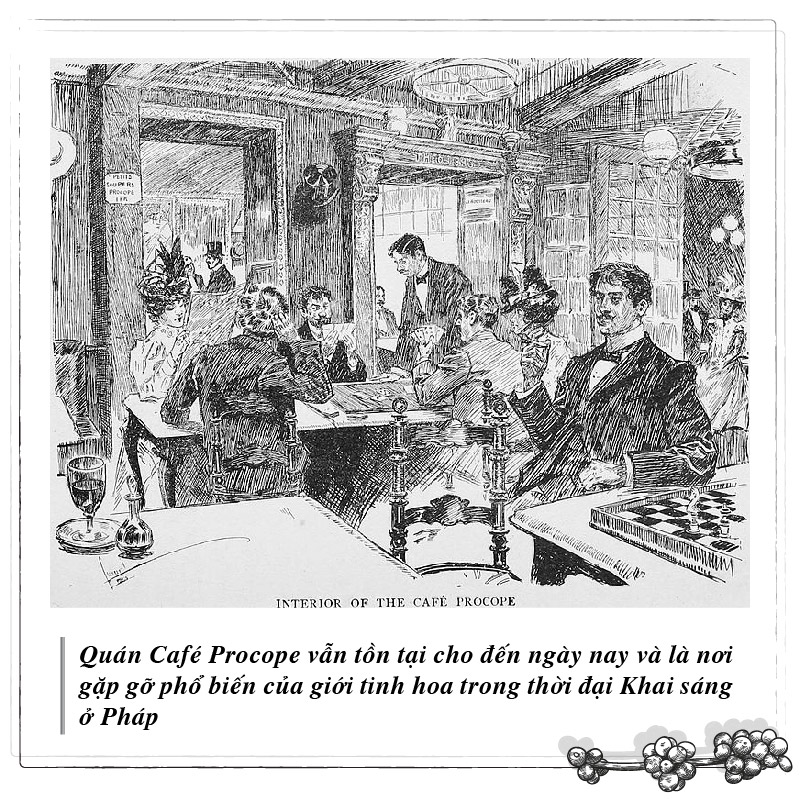Article 90: Coffee shops and the pursuit of authentic happiness
In the course of history, coffee shops have been the ideal environment for the process of penetrating the mind, thinking about people, and starting the important doctrines of Psychology.

“Coffee gives you time, but not actual hours or minutes, but a chance to be, like be yourself.” – Novelist Gertrude Stein (1874 – 1946)
The passion for pursuit of happiness
Since the time of ancient civilizations such as Egypt, Greece, China, India and Persia, questions related to the human mind have been studied and answered at a philosophical level. Depression, memory loss, or the way the mind works, perception … is recorded through the form of reflection, observation, anatomy, and even experiments recorded in ancient texts such as Ebers Papyrus, or done by many thinkers such as Socrates (470-399 BC), Plato (428 – 347 BC), Aristotle (384 – 322 BC), Ahmed ibn Sahl al-Balkhi (850 – 934)…
However, in the mid-15th century, for the first time, the Latin term “psychologia” was recorded for the first time in the treatise title “Psychiologia de ratione animae humanae” (Psychology, about the nature of the human soul) by the humanist Marko Marulić (1450-1524). And in 1590, this term was used in the book “Psychologia: hoc est de hominis perfectione, anima, ortu” by the German philosopher Rudlof Goeckel (1547-1628), and became popular through the works “Psychologia empirica” and “Psychologia rationalis” by the idealist philosopher Christian Wolff (1679 – 1754) with the meaning of the science of the mind. However, it was not until the 19th century that Psychology officially became an independent science, developing strongly with the birth of many influential schools today.

The title containing the term on Psychology appears in the list of works by Marko Marulic mentioned by writer Franjo Bozicevic-Natalis in “Vita Marci Maruli Spalatensis”
The term “Psychologia” is derived from the Ancient Greek word for “studying of the soul”, which is a combination of the word “psychē” – “ψυχή” meaning “soul” and the word “logia” – “λογία”. ” means “study”. In Greek mythology, “psyche” is also associated with the story of the beautiful Psyche with her own efforts, overcoming adversity caused by misconceptions and challenges of social life to pursue authentic happiness. Understandably, the aim of Psychology is to study emotions, will and actions of people, as well as the impact of physical – social influences on behavior and spirit of each individual to understand, from there to improve, and reach for a better life.
In the 19th century, European society entered a period of decline, known as the Fin-de-Siècle – The moment of transition. The main reason is due to the explosion of the industrial revolution and scientific and technological progress, giving birth to many new streams of thought affecting European politics and society. The middle class was deeply influenced by the democratic ideas of the French revolution, the lower class began to be influenced by the ideas of socialism, communism and anarchy. Meanwhile, the new capitalist class aspires to Liberalism.
The spirit of the Fin-de-Siècle era divided into two distinct trends. On the one hand, there is a downward spiral from fatigue, skepticism, pessimism, and the widespread belief that civilization will cause society to decline. The other side is filled with faith in reality and the future, pursuing science to try to decipher the world they live in. This has caused people to fall into a crisis of consciousness and arouse a greater and greater desire for spiritual liberation. The intellectuals living in the Fin-de-Siècle era are also always looking for answers to human spiritual life, how to get out of the crisis to reach authentic happiness.

During the Fin-de-Siècle period, coffee shops were places where intellectuals gathered, looking for a way to liberate their inner self and lead a free and happy life.
It is the efforts to decipher the spiritual world, to guide people in pursuit of happiness from self-awareness, to open their minds to overcome crises and stagnation from social life, to come to establishing the right attitude and behavior with the community, created conditions for the strong development of Psychology in this period. Among them, the important milestone was that in 1879, Wilhelm Wundt established the first Psychology laboratory in Leipzig, Germany and separated Psychology into an independent science. Following Wilhelm Wundt’s extensive research efforts on the workings of the brain, what constitutes consciousness and the human mind, many psychological theories were born in the 19th and 20th centuries, contributing to the perfection in Psychology.
Coffee shop – A space to open your mind
In the 16th century, coffee was an essential drink of Ottoman social life and coffee shops functioned as a place to chat and exchange knowledge of all walks of life of all religions and professions, called “Mekteb-i ‘irfan” – the school of knowledge. By the 17th and 18th centuries, coffee shops were present throughout Europe, becoming the spiritual center of the Enlightenment era, disseminating ideals and knowledge to the whole society.
Open to all subjects, open to sharing knowledge, as well as freely debating new ideas, coffee shops have become the ideal space for people to open their minds and to understand their own souls. There, people can clearly reflect on themselves, voice their hearts, desires, and aspirations, as well as be alert enough to listen to others in order to properly perceive themselves, society and how people should live, as well as find a voice that resonates with people who share the same ideals.
Therefore, it is not by chance that coffee shops are still a reliable place for intellectuals to gather, research and debate current issues, about human spiritual life, to rediscover nature and the human role in the development of society. Especially in Europe, from the 18th to 20th centuries, a system of theoretical knowledge and research on human perception, emotions, and behavior was formed from the cafeteria spaces, opening many psychology theories that have a profound influence on modern psychology today.

The coffee shop is a space for intellectuals to meet and share their personal views on the aspiration of the times and the human spirit.
In France, Café Procope is the place where great philosophers such as Immanuel Kant, Jean-Jacques Rousseau, Denis Diderot, Voltaire… discussed and wrote famous research works, thoroughly influencing all fields. Among those, the thought of Jean-Jacques Rousseau (1712-1778) influenced the theory of Moral Psychology and Child Psychology. The French materialist philosopher Denis Diderot (1713-1784) was one of the first to notice that any materialist must deal with the question of the brain’s role, function, and relationship between the brain and the spirit. Or the Café de la Régence, frequented by the elite, most famously the meeting of Karl Marx (1818-1883) and Friedrich Engels (1820-1895) in August 1844. The two collaborated and pursued research, development of philosophical arguments, and the founding of scientific socialism. Later, Marx’s philosophy became the theoretical and methodological basis for Activity Psychology.
In the late 19th century and early 20th century, in Vienna, the cafe operated as a research club and a space associated with the formation and development of the Psychoanalytic school. At Café Korb, Sigmund Freud (1856-1939) founded the Psychoanalytic Society in 1908 and regularly held talks there. And at Café Landtmann, Freud developed a worldview and spent hours exploring the essentials that an orderly society needs to function and overcome a state of inner conflict. From here, important works that forever changed Freud’s understanding of human nature were born. In it, Essais de Psychanalyse (1927, Psychoanalytic Research), Group Psychology and the Analysis of the Ego (1921, Crowd Psychology and Analysis of the Ego) was based on and applied by Freud from the classic work “La psychologie des foules” (1895, Psychology of Crowds) by social psychologist Gustave Le Bon (1841-1931).
“Psychology of crowds” by Gustave Le Bon is one of the books carefully selected by the Founder and Chairman of Trung Nguyen Legend Group Dang Le Nguyen Vu along with more than 100 books in 12 core areas of humanity to create the Life-changing Foundation Bookcase.

The Procope cafe still exists today and was a popular meeting place for elites during the French Enlightenment.
From the debates, sharing views at Café Korb space, psychologist Alfred Adler (1870 – 1937) initiated the theory of Individual Psychology. In 1912, he founded the Society of Personal Psychology and often met at Café Siller, Café Central. Psychologists and sociologists such as Carl Gustav Jung (1875-1961), Karen Horney (1885-1952), Harry Stack Sullivan (1892-1949) … have perfected psychoanalytic theory through the development of schools of Analytical Psychology, Feminine Psychoanalysis, Child Psychoanalysis…
In the US, psychologist John Broadus Watson (1878 – 1958) founded the School of Behavioral Psychology in 1913, strongly influencing the development of American and world psychology throughout the 20th century. Even the basic principles of Behavioral Psychology are still widely used today, in raising and educating children. Through his behavioral approach, Watson has conducted research into animal behavior, child rearing, and the advertising sector. In the 1950s, John Broadus Watson created the “coffee break” advertising idea for the Maxwell House Cafe. Although it appeared in the 19th century, it was not until Watson’s advertising campaign spread that the concept of “coffee break” became widespread in American culture and around the world to this day.
Thus, with the function of awakening, coffee and coffee shops have become a catalyst to promote the search for answers about the path to authentic happiness of everyone as well as the community. In other words, the coffee shop has provided a free and open cultural space for everyone to rediscover him/herself and social life, together decipher the deep aspirations in the mind and identify own role in the journey to build a more meaningful and better life.
Readers are cordially invited to watch the series of Coffee Tao videos posted on https://bit.ly/caphetrietdao
THE REAL COFFEE
ROASTED ONLY FOR PEOPLE OF WISDOM!
Source: “The Philosophical Way of Coffee” – copyright by Trung Nguyen Legend
Coming up: John Broadus Watson and the “coffee break” culture that celebrates a creative lifestyle


